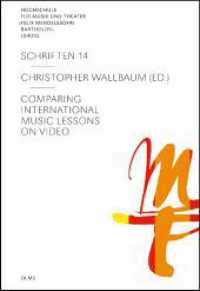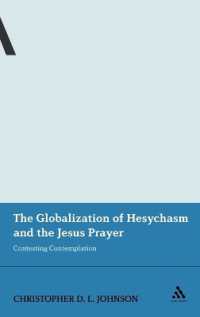- ホーム
- > 洋書
- > 英文書
- > History / World
Full Description
Historical surveys of postwar Japan are usually established on the grounds that the era is already over, interpreting "postwar" to be the years directly proceeding World War II. However, the contributors to this book take a unique approach to the concept of the postwar epoch and treat it as a network of historical time frames from the modern period, and connect these time capsules to the war to which they are inextricably linked. The books strength is in its very interdisciplinary approach to examining postwar Japan and as such it includes chapters centred on subjects as diverse as politics, poetry, philosophy, economics and art which serve to fill the blanks in the collective cultural memory that historical narratives leave behind.
Originally published in French, this new translation offers the English speaking world important access to a major work on Japan which has been greatly enriched by the translator's great accuracy and knowledge of English, French and Japanese language, history and culture.
Japan's Postwar will appeal to students and scholars of Japanese Studies and Modern Japanese History as well as historians studying the world after 1945.
Contents
Introduction Part 1: The Multiplicity of Chronologies, or The Postwar as Focus 1. The Postwar as Political Paradigm 2. The Evolution of the Concept of 'Postwar Education' Part 2: The Intellectuals Facing the Future 3. Maruyama Masao, From Autonomy to Pacifism 4. At the Time, after the Defeat: Sakaguchi Ango, Takeda Taijun, Takeuchi Yoshimi (1946-1948) 5. Yasuoka Masahiro, a Conservative Vision of the Postwar Part 3: How Should One Speak? The Poets' Response 6. 'Genzai', Here and Now 7. Speaking Silence: The Poetry of Ishihara Yoshirō Part 4: Forgetting, Commemoration, Perversion: The Regimes of Memory 8. The Literary Institution and the Case of the Akutagawa Prize 9. The 'Statue for Peace' in Nagasaki 10. Repression of History and Engagement of the Body Part 5: Complex Experiences: Society on the Road to Democracy 11. The 'Red Purges' and the Democratisation of Japan, 1949-196212 Labour Relations during the Years of High Growth 13. The Postwar for Workers' Unionism and Movements Against Industrial Pollution





